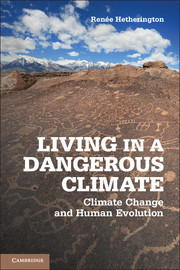Book contents
- Frontmatter
- Contents
- Figures
- Tables
- Foreword: Evolution and the Human Condition
- Acknowledgments
- Preface
- Earth’s Climate
- The Evolution of the Homo Species
- Climate and Human Migration
- Climate and Agriculture
- The Dominant Paradigm
- 9 Dominance Destabilized
- 10 Fitness Folly
- 11 Darwin the Selector
- 12 Hunting Down Woody
- 13 Kammerer’s Suicide
- 14 Giants and Pygmies
- 15 Dutch Hunger Winter Babies
- Today and Tomorrow
- The Economic Connection
- Dangerous Attitudes
- Living in Dangerous Times
- Glossary
- Notes
- Index
9 - Dominance Destabilized
Published online by Cambridge University Press: 05 June 2012
- Frontmatter
- Contents
- Figures
- Tables
- Foreword: Evolution and the Human Condition
- Acknowledgments
- Preface
- Earth’s Climate
- The Evolution of the Homo Species
- Climate and Human Migration
- Climate and Agriculture
- The Dominant Paradigm
- 9 Dominance Destabilized
- 10 Fitness Folly
- 11 Darwin the Selector
- 12 Hunting Down Woody
- 13 Kammerer’s Suicide
- 14 Giants and Pygmies
- 15 Dutch Hunger Winter Babies
- Today and Tomorrow
- The Economic Connection
- Dangerous Attitudes
- Living in Dangerous Times
- Glossary
- Notes
- Index
Summary
Once a man had begun, on account of his culture’s ethos, to feel ambivalent about his own animal nature, as well as actual animals, his approach to hunting would necessarily be affected too. The respect, verging on tenderness, of the hunter-gatherer – the Bushman, say, who poured a little fresh water in the mouth of an antelope he had killed – would fall away swiftly.
Carol Lee Flinders, Rebalancing the WorldBefore proceeding, I would like to emphasize the distinction between adaptation and adaptability. In the realm of human action, we commonly use the word “adaptation” to mean behavioral change. For example, we “adapt to the cold” by lighting fires and wearing additional clothes. However, in evolutionary terms, “adaptation” refers to Darwinian natural selection of genetic changes appropriate to particular conditions. In this case, “adaptation to the cold” might refer to hereditary changes in the subcutaneous tissue, hair structure, and general anatomy that would help an organism stay warm in cold conditions. An example would be the large body and thick coat of the woolly mammoth during the last ice age.
An adaptation is frequently defined as a genetically fixed trait, such as the structure of a head. Because the anatomy is genetically fixed, little modification is possible unless a genetic mutation produces a different fixed form. (This is why the Maya people resorted to pressing and binding the malleable skulls of their children: their genetics did not naturally create and form a conical skull shape despite the perceived cultural benefit.) When a genetic mutation happens, the organism cannot return to the original condition, so the evolutionary result is inflexible.
- Type
- Chapter
- Information
- Living in a Dangerous ClimateClimate Change and Human Evolution, pp. 99 - 105Publisher: Cambridge University PressPrint publication year: 2012



